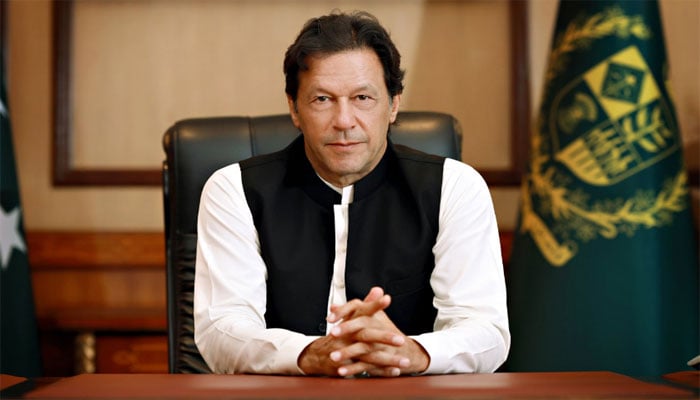PM constitutes Economic Advisory Council
Prime Minister Imran Khan has constituted a 18-member Economic Advisory Council (EAC) to ensure that the best possible professional advice is available to the government to inform, optimise and synergise the formulation and implementation of its economic and financial policies.
ISLAMABAD: Prime Minister Imran Khan has constituted a 18-member Economic Advisory Council (EAC) to ensure that the best possible professional advice is available to the government to inform, optimise and synergise the formulation and implementation of its economic and financial policies.
However, all such EACs constituted in last one decade had failed to deliver any good and most of the time it were used as tool to get patronage for doing personal work of members of the EAC.
According to an official notification, the secretary of Finance Division will be secretary EAC and 11 members included into EAC are renowned economists, researchers, academicians and others. Some of them belonged to foreign reputed institutes of the world, mainly from US and UK.
Imran Khan has included mostly renowned professionals into the fold of the EAC like Dr Farrukh Iqbal, Dean and Director Institute of Business Administration (IBA), Dr Ashfaque Hassan Khan, Principal and Dean School of Social Sciences and Humanities (NUST), Dr Ijaz Nabi, Professor of Economics Lahore University of Management Sciences (LUMS), Dr Abid Qaiyum Suleri, Executive Director Sustainable Development Policy Institute (SDPI), Dr Asad Zaman, Vice Chancellor of Pakistan Institute of Development Economics (PIDE), Dr Nawid Hamid, Professor of Economics at Lahore School of Economics (LSE), Syed Salim Raza, former Governor SBP, Atif Mian, Princeton University (Department of Economics and Woodrow Wilson School of Public Policy), Dr Asim Ijaz Khawaja, Sumitomo-FASID Professor of International Finance and Development at Harvard Kennedy School, and Dr Imran Rasul, Professor of Economics Department of Economics University College London.
There will be seven official members of the EAC, including minister for finance, revenues and economic affairs, minister for planning, development and reforms, deputy chairman Planning Commission, governor State Bank of Pakistan, adviser on institutional reforms, adviser on commerce and secretary finance.
The EAC shall meet at least once a month and its mandate will be to advise the government on both short-term macroeconomic stabilisation interventions and long-term structural reforms for stable and sustained economic development.
The EAC is expected to play a pivotal role in strengthening the capacity of the government to design and introduce sound and effective policies for rapid and continued social and economic advancement, human resource development, improvement of business processes and strengthening of data services.
The Council will also facilitate capacity building of the government in conducting policy analysis and will assist in reaching out to the international network of recognised economists to contribute to Pakistan’s development.
Ministry of Finance will be the nodal government agency for the EAC, which will function in an entirely non-partisan manner and is expected to strengthen existing state institutions in a collaborative and concerted manner.
The ultimate goal of the Council is to promote analytically sound and evidence-based reforms and initiatives for the progress and development of Pakistan.
-
 Teyana Taylor Reveals What Lured Her Back To Music After Earning Fame In Acting Industry
Teyana Taylor Reveals What Lured Her Back To Music After Earning Fame In Acting Industry -
 Prince William Shows He's Ready To Lead The Monarchy Amid Andrew Scandal
Prince William Shows He's Ready To Lead The Monarchy Amid Andrew Scandal -
 Lux Pascal Gushes Over Role In Tom Ford's 'Cry To Heaven': 'I Just Wanted To Be Part Of This Picture'
Lux Pascal Gushes Over Role In Tom Ford's 'Cry To Heaven': 'I Just Wanted To Be Part Of This Picture' -
 Near-blind Refugee Found Dead In Buffalo After Release By US Border Patrol
Near-blind Refugee Found Dead In Buffalo After Release By US Border Patrol -
 Firm Steps In Forcing Andrew’s Hand: ‘Can No Longer Keep A Promise'
Firm Steps In Forcing Andrew’s Hand: ‘Can No Longer Keep A Promise' -
 Kenyan Man Accused Of Recruiting Men To Fight In Ukraine
Kenyan Man Accused Of Recruiting Men To Fight In Ukraine -
 'The Wrong Paris' Star Veronica Long Shares What New Crime Series 'Blue Skies' Is About
'The Wrong Paris' Star Veronica Long Shares What New Crime Series 'Blue Skies' Is About -
 King Charles Remains Immersed In Work Amid Andrew Scrutiny
King Charles Remains Immersed In Work Amid Andrew Scrutiny -
 Bobby J. Brown's Passing Adds To Growing List Of Celebrity Deaths In 2026
Bobby J. Brown's Passing Adds To Growing List Of Celebrity Deaths In 2026 -
 Prince William Fears For Andrew's Mental Health
Prince William Fears For Andrew's Mental Health -
 Paige DeSorbo Breaks Silence On New Relationship With Joe D'Amelio
Paige DeSorbo Breaks Silence On New Relationship With Joe D'Amelio -
 'Marshals' Showrunner Reveals If Kayce And Beth Will Cross Paths In 'Yellowstone' Spinoff
'Marshals' Showrunner Reveals If Kayce And Beth Will Cross Paths In 'Yellowstone' Spinoff -
 Belgium Watchdog Launches Antitrust Probe Into Google Ads Business
Belgium Watchdog Launches Antitrust Probe Into Google Ads Business -
 Andrew Ready To Fight Back: 'He's Very Vengeful'
Andrew Ready To Fight Back: 'He's Very Vengeful' -
 After Surpassing 100 Million YouTube Subscribers, BLACKPINK Returns With New Release
After Surpassing 100 Million YouTube Subscribers, BLACKPINK Returns With New Release -
 Rihanna Sends Fans Into Frenzy With BTS Footage Of Music Making: Watch
Rihanna Sends Fans Into Frenzy With BTS Footage Of Music Making: Watch




